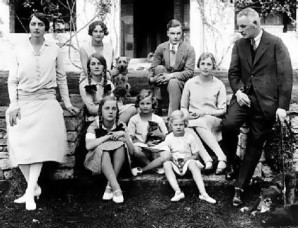
(Derbyshire, United Kingdom) – Deborah Cavendish, the last of the six famed and eccentric Mitford sisters who were prominent in English society in the years surrounding World War II, died last week at the age of 94. Aristocratic, iconic, and glamorous, the sisters helped to define a feminine role, very different from today’s, in a long lost era. In the end, however, they will be best remembered for the links of two of the siblings, Diana and Unity, to Adolph Hitler.
Her funeral a few days ago was attended by Prince Charles and the Duchess of Cornwall.
Deborah Vivien Freeman-Mitford, the youngest of the sisters, was born in 1920 to a well healed family, rich in real estate and prestige, but running low on cash. In the tradition of the day Deborah’s mission was to find a man of wealth, and in 1941 she married Andrew Cavendish. By 1950 they had inherited the vast 35,000 acre Chatsworth estate in Derbyshire.
As with many of the large ancestral estates of the time, the financing of day to day operations became a challenge. In the years after World War II, Deborah, through innovation and entrepreneurship, helped transform the property into a self-sustaining operation. By 2002, it would have 600,000 visitors per year and over $6.5 million in annual revenue. The feminists of today would be proud, but it was hardly the destiny envisioned at the time of her birth.
In the late 30’s, Deborah’s older sister Unity (1914-1948) moved to Germany and became enthralled with Adolph Hitler. In 2007, an hour-long BBC documentary, “Hitler’s British Girl”, examined whether she might have given birth in 1940 to his child. Almost certainly she hadn’t. It’s undisputed, though, that in the years before the war she had socialized extensively with him and had very much pursued a sexual relationship.
In truth, Unity had unsuccessfully attempted suicide shortly after the start of Britain’s entry into World War II. She survived the attempt but required care for the rest of her life. It turns out that a number of births, presumably to unwed teenage mothers, were recorded at the invalid home where she had stayed upon her return. According to the daughter of a woman who had worked there, the child, who would be in his mid-70’s today, would have been given up for adoption. Unity died from her injuries eight years later in 1948.
The oldest sister, Nancy (1904-1973), helped to define the snobbish, social stratification of British society. She is credited with coining the terms “U [as in upper class]” and “non-U.” Several of her books, mostly about European society, were well received at the time but are of no particular interest to today’s generation.
Pamela (1907-1994) chose to stay out of the limelight but is also reported to have had anti-Semitic sentiments. Thomas (1909-1945), the single brother, was also less well known, but had attended one of Hitler’s Nurnberg rallies before the war.
Dianna (1910-2003) also found controversy. In 1936 she married Oswald Mosley, the rabidly anti-Semitic leader of the British Union of Fascists. The wedding took place at the house of Joseph Goebbels with Hitler in attendance.
In 2007 Diana’s daughter, Charlotte, published the book, “Mitfords: Letters between Six Sisters.” In the style of the day, the sister’s preferred method of communication was long hand-written letters, always using their chosen, inter-family nicknames: Binky, Debo, Decca, and Bobo, to name a few.
Charlotte’s book was not well received by the Jewish community. The sisters were described as the “great wits and beauties of their age.” Writing in Commentary Magazine, Benjamin Ivry made clear that there was nothing “witty or beautiful” about Unity and Diana’s adulation of Hitler.
The last sister, Jessica, shared her sibling’s idolization of strong charismatic leaders, but her preference was for the political left. By 1939, Jessica had moved to the United States with her new husband, Esmond Romily, a nephew of Winston Churchill. Romily died in the war and she went on to marry Robert Treuhaft, a Washington DC attorney with a bent for left wing causes. Within a few years they would settle in Berkeley, California.
In the early 60’s she had authored a best-selling book about the American funeral industry. Her other works included “Hons and Rebels” about her storied childhood, and “The Trial of Dr. Spock” among others.
On a personal note, Jessica’s book about Spock and Coffin was reviewed here by my father, a Yale Law School professor, in 1969. A couple of years later a student who had probably taken classes from him interned at Robert Truehaft’s law firm in California. He may well have asked her what she thought of the professor who didn’t like his wife’s book. The intern: Hilary Rodham.
Debra’s most important accomplishment was to preserve the Chatsworth estate. In doing so she created about 100 jobs and helped to further many cherished British traditions. She had hardly followed the path defined for her in childhood where only men would be educated or allowed to lead.
 Wrongful Conviction News an Injustice anywhere website
Wrongful Conviction News an Injustice anywhere website
